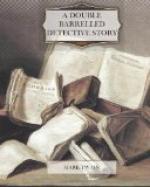“I will obey, mother.”
“I believe it, my child. The preparations are all made; everything is ready. Here is a letter of credit; spend freely, there is no lack of money. At times you may need disguises. I have provided them; also some other conveniences.” She took from the drawer of the typewriter-table several squares of paper. They all bore these typewritten words:
$10,000 Reward
It is believed that a certain man who is wanted in an Eastern state is sojourning here. In 1880, in the night, he tied his young wife to a tree by the public road, cut her across the face with a cowhide, and made his dogs tear her clothes from her, leaving her naked. He left her there, and fled the country. A blood-relative of hers has searched for him for seventeen years. Address . . . . . . . . . , . . . . . . . . . . , Post-office. The above reward will be paid in cash to the person who will furnish the seeker, in a personal interview, the criminal’s address.
“When you have found him and acquainted yourself with his scent, you will go in the night and placard one of these upon the building he occupies, and another one upon the post-office or in some other prominent place. It will be the talk of the region. At first you must give him several days in which to force a sale of his belongings at something approaching their value. We will ruin him by and by, but gradually; we must not impoverish him at once, for that could bring him to despair and injure his health, possibly kill him.”
She took three or four more typewritten forms from the drawer —duplicates—and read one:
. . . . . . . . . . , . . . . . .
. . . . , 18.
.
. .
To Jacob Fuller:
You have . . . . . . days in which to settle your affairs. You will not be disturbed during that limit, which will expire at . . . . . . M., on the . . . . . . of . . . . . . . You must then move on. If you are still in the place after the named hour, I will placard you on all the dead walls, detailing your crime once more, and adding the date, also the scene of it, with all names concerned, including your own. Have no fear of bodily injury —it will in no circumstances ever be inflicted upon you. You brought misery upon an old man, and ruined his life and broke his heart. What he suffered, you are to suffer.
“You will add no signature. He must receive this before he learns of the reward placard—before he rises in the morning—lest he lose his head and fly the place penniless.”
“I shall not forget.”
“You will need to use these forms only in the beginning—once may be enough. Afterward, when you are ready for him to vanish out of a place, see that he gets a copy of this form, which merely says:
“Move on. You have . . . . . . days.”




